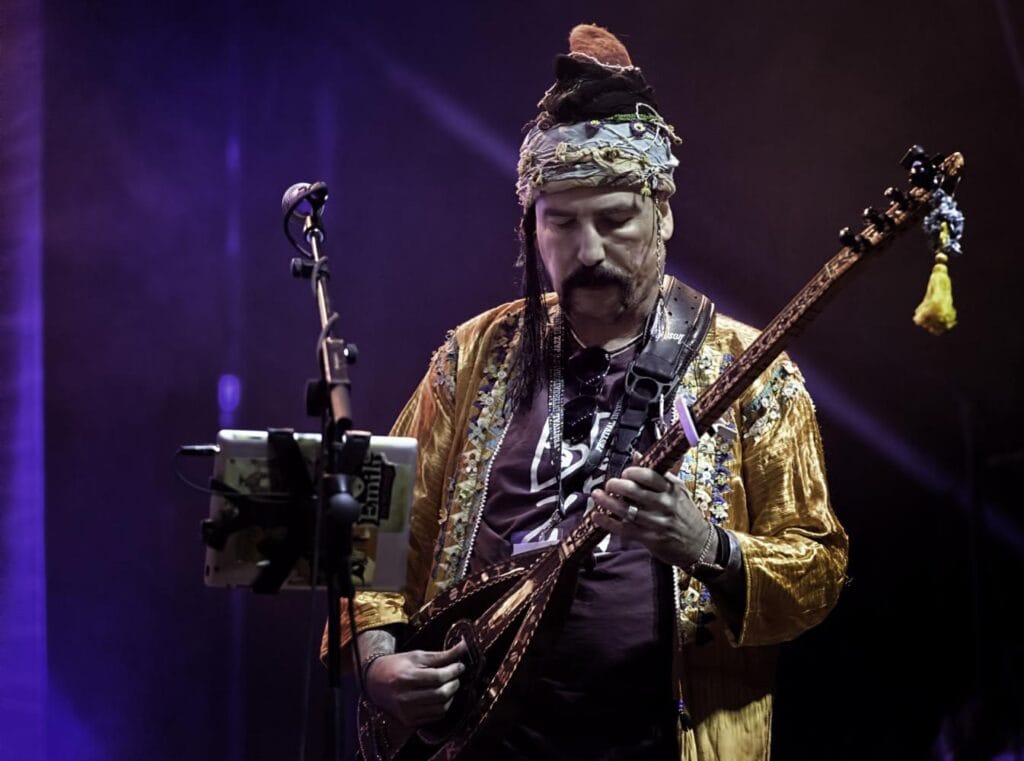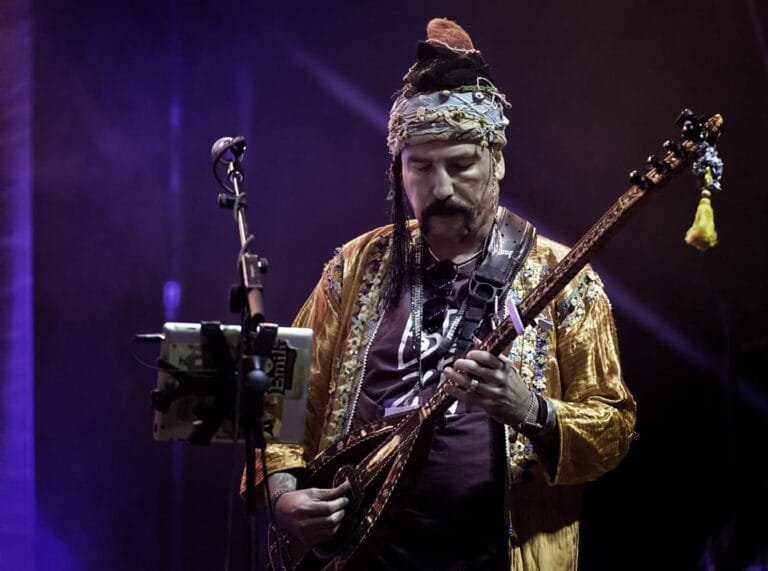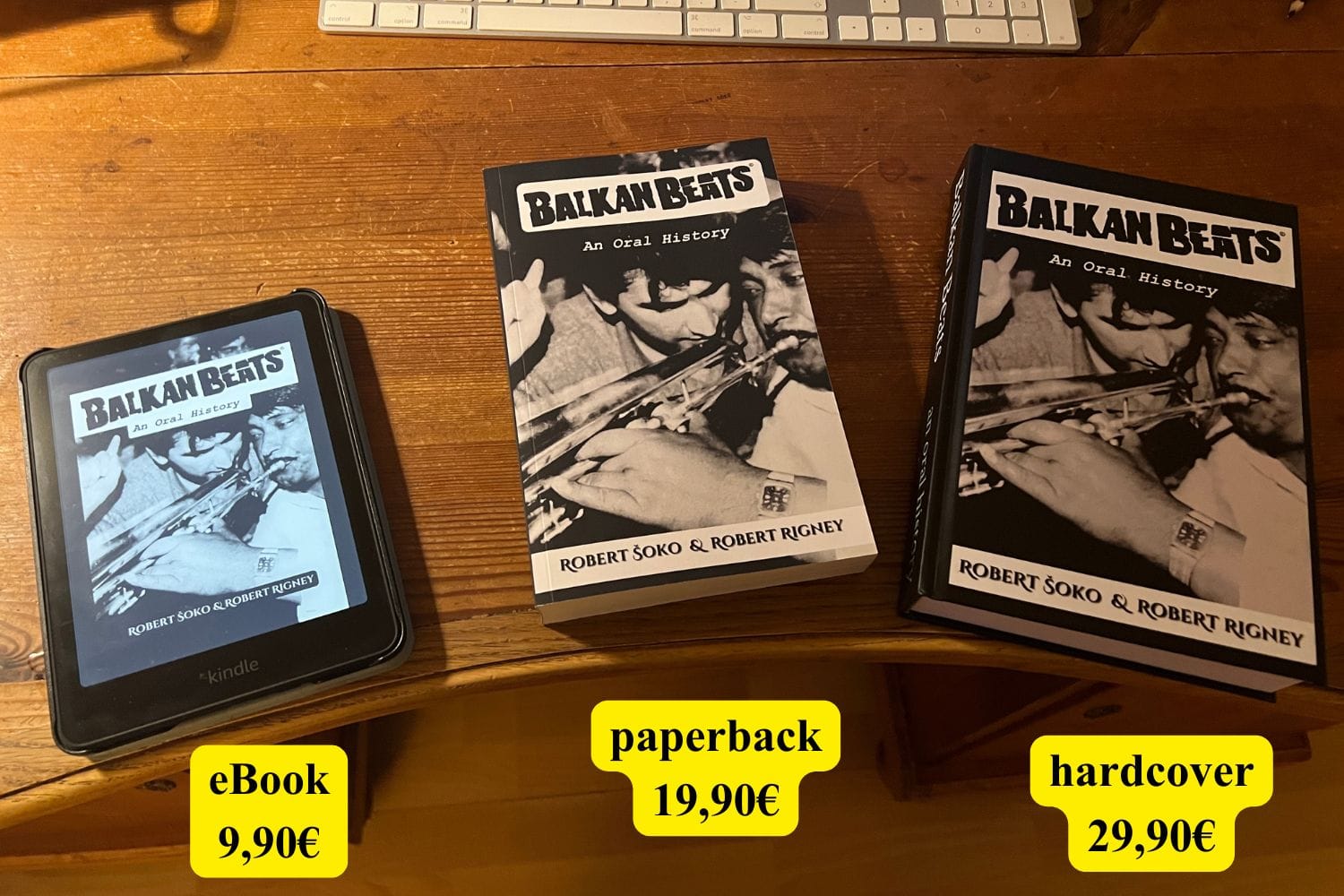
Interview with Murat Ertel (Baba Zula)
Robert Rigney: The energy at your last concert at SO36 in Berlin was at an unusually high level. I’d be curious to know how it ranks in comparison with your other shows.
Osman Murat Ertel: Some say it was our best concert in a while. In general we try to play less; shorter sets. We are supposed to play for one hour, but it always turns out that we play for two hours or more. It’s very hard for us to keep our sets short.
In the beginning we played for like three hours. But of late the audience response has been so strong – what with people wanting encores and so on – that we have tried shortening the sets. We see people getting high and reacting strongly and enthusiastically, to an extent that it is difficult to exit the stage on time. We are against the clubs turning out our audiences, right after the show is over because we want to mingle with the audience after the shows, signing merchandise etc.
Robert Rigney: Now you guys are seen as being the godfathers of Turkish psychedelic music. You are seen by the younger generation purveyors of this sound as such. How do you feel about being looked up to in this way?
Osman Murat Ertel: It is true that some of the new Turkish acts like Altin Gün and Lalalar see us as kind of godfathers of this style of music. As a result, more young people are coming to our concerts. This has to do with the hype surrounding Turkish music, because Turkish psychedelia is listened to now around the world. The audience is getting younger. Also we have a bass player now, which is making the music more groovy and more danceable.
I really like this new popularity of Turkish psychedelic music. We are in the middle. In the past, we were the ones who were following upon and responding to the first generation of Turkish psychedelic rock, like Mogular, Baris Manco and Erkin Koray. In the nineties, while their popularity was waning away, we were keeping the flame alive, while at the same time bringing in new elements. We created a sub-genre, which we are calling, “Istanbul Psychedelic”.
Robert Rigney: How is Baba Zula different from the first generation of Anatolian rock?
Osman Murat Ertel: We interpret the old songs, while at the same time, make our own original compositions and using electronic effects and also making use of the electric saz, which the older generation like Mogular didn’t use, not even to a large extent Erkin Koray. Theirs was more an acoustic sound. We put in elements like drum machines and samplers. Ours is a very urban, Istanbul sound.
Robert Rigney: How do you account for this present interest in Turkish music?
Osman Murat Ertel: Up until now colonial music has been very interesting. Other countries of the West, because of their colonial histories have seen a rise of music from former colonies, like Jamaica and some African countries. But with regards to Turkey, Turkey never benefited from this. Turkey itself was a colonizing power. But now the spotlight is on Turkey, because of Altin Gün, Lalaler. etc. This is very good for Turkish music. Turkish music deserves this new attention. But only the most knowledgeable people know our music. It is the very tip of the iceberg. We are hoping that what happened to blues music will happen to Turkish music. Ours is the new blues.
Robert Rigney: Baba Zula are the perennial outsiders of Turkish music. You are too avant-garde and foreign for the common Turk and too embarrassingly Eastern for many Western-leaning Turks.
Osman Murat Ertel: Yes, this is exactly right. We are out of the system. Our songs can’t get played on the radio, one reason being that they are too long. The also reason is that we are critical of the government and the powers that be.
We are banned in Turkey, so we can not reach people through tv and radio. Therefore, it is not possible for common people to know us. We only had one hit song: “Bir Sana Bir Debana”. It was a hit song using formulas. But we are bored of formulas. We don’t even play this song.
Robert Rigney: How does the critical attitude of Baba Zula manifest itself?
Osman Murat Ertel: We don’t directly criticize the government. Our criticism is veiled. But people in the know, know that we are political. Even our costumes are political. Because we wear pre-Islamic shamanistic costumes and also costumes of people who revolted against the Ottoman Empire.
We have to be careful, however, not to fall into prison. We have to convey our message in an intellectual way.
Robert Rigney: Have you gotten into trouble at all with the authorities?
Osman Murat Ertel: But we have had concerts cancelled. Till now we have not been taken to court. We don’t speak about religious matters. But the new album is more political. We were awaiting a response from the authorities, but so far it hasn’t come.
Robert Rigney: How is the new album political?
Osman Murat Ertel: All the songs with lyrics are political. Three songs are political: one song about killing nature. Another song about the power of money, about building new hotels. Beating the protestors. I thought I was going to be sent to court, but nothing happened.
Robert Rigney: At the beginning of your Berlin show you gave a brief shout out to end the genocide in Gaza. I thought this was rather courageous.
Osman Murat Ertel: Also, during our concerts we spoke out against the genocide that is going on in Gaza. We realize that in Germany there is even worse censorship than in Turkey. Here people are forced to sign documents promising not to say certain things. We think that firstly, people should stop killing people. The killing of old people, women and children should stop. There are certain people in power who are like vampires, sucking the blood of the people. This must stop. But you can’t say this in Germany. This control has to do with the fact of the Second Word War and how at the end of the war Germany was forced to sign secret documents by the US government. So, we aren’t just demanding freedom in Turkey, we are demanding freedom for the whole world. Music should be more political. It shouldn’t just be about the joys of the world.
Robert Rigney: By drawing attention to injustice on a global scale, not just on a Turkish scale, Baba Zula has the potential to widen its audience. How do you see this?
Osman Murat Ertel: Baba Zula has a chance to stand for criticism not just of Turkey but Germany and the entire world. But language is a barrier.
Now if you look at the music that is dominating the charts, there are no bands, just some singers, singing about trivial subjects. It’s been this way for more than twenty years. The system has already collapsed. Now it is just feeding on itself. It’s a false dream. We want to wake people up. Art offers a way to survive. I want us to be more like warriors. Sometimes I feel like I am a sound warrior.
Copyrights © Robert Rigney, Berlin Oct. 2024
An Interview with Osman Murat Ertel of Baba Zula
Robert Rigney: The energy at your last concert at SO36 in Berlin was at an unusually high level. I’d be curious to know how it ranks in comparison with your other shows.
Osman Murat Ertel: Some say it was our best concert in a while. In general we try to play less; shorter sets. We are supposed to play for one hour, but it always turns out that we play for two hours or more. It’s very hard for us to keep our sets short.
In the beginning we played for like three hours. But of late the audience response has been so strong – what with people wanting encores and so on – that we have tried shortening the sets. We see people getting high and reacting strongly and enthusiastically, to an extent that it is difficult to exit the stage on time. We are against the clubs turning out our audiences, right after the show is over because we want to mingle with the audience after the shows, signing merchandise etc.
Robert Rigney: Now you guys are seen as being the godfathers of Turkish psychedelic music. You are seen by the younger generation purveyors of this sound as such. How do you feel about being looked up to in this way?
Osman Murat Ertel: It is true that some of the new Turkish acts like Altin Gün and Lalalar see us as kind of godfathers of this style of music. As a result, more young people are coming to our concerts. This has to do with the hype surrounding Turkish music, because Turkish psychedelia is listened to now around the world. The audience is getting younger. Also we have a bass player now, which is making the music more groovy and more danceable.
I really like this new popularity of Turkish psychedelic music. We are in the middle. In the past, we were the ones who were following upon and responding to the first generation of Turkish psychedelic rock, like Mogular, Baris Manco and Erkin Koray. In the nineties, while their popularity was waning away, we were keeping the flame alive, while at the same time bringing in new elements. We created a sub-genre, which we are calling, “Istanbul Psychedelic”.
Robert Rigney: How is Baba Zula different from the first generation of Anatolian rock?
Osman Murat Ertel: We interpret the old songs, while at the same time, make our own original compositions and using electronic effects and also making use of the electric saz, which the older generation like Mogular didn’t use, not even to a large extent Erkin Koray. Theirs was more an acoustic sound. We put in elements like drum machines and samplers. Ours is a very urban, Istanbul sound.
Robert Rigney: How do you account for this present interest in Turkish music?
Osman Murat Ertel: Up until now colonial music has been very interesting. Other countries of the West, because of their colonial histories have seen a rise of music from former colonies, like Jamaica and some African countries. But with regards to Turkey, Turkey never benefited from this. Turkey itself was a colonizing power. But now the spotlight is on Turkey, because of Altin Gün, Lalaler. etc. This is very good for Turkish music. Turkish music deserves this new attention. But only the most knowledgeable people know our music. It is the very tip of the iceberg. We are hoping that what happened to blues music will happen to Turkish music. Ours is the new blues.
Robert Rigney: Baba Zula are the perennial outsiders of Turkish music. You are too avant-garde and foreign for the common Turk and too embarrassingly Eastern for many Western-leaning Turks.
Osman Murat Ertel: Yes, this is exactly right. We are out of the system. Our songs can’t get played on the radio, one reason being that they are too long. The also reason is that we are critical of the government and the powers that be.
We are banned in Turkey, so we can not reach people through tv and radio. Therefore, it is not possible for common people to know us. We only had one hit song: “Bir Sana Bir Debana”. It was a hit song using formulas. But we are bored of formulas. We don’t even play this song.
Robert Rigney: How does the critical attitude of Baba Zula manifest itself?
Osman Murat Ertel: We don’t directly criticize the government. Our criticism is veiled. But people in the know, know that we are political. Even our costumes are political. Because we wear pre-Islamic shamanistic costumes and also costumes of people who revolted against the Ottoman Empire.
We have to be careful, however, not to fall into prison. We have to convey our message in an intellectual way.
Robert Rigney: Have you gotten into trouble at all with the authorities?
Osman Murat Ertel: But we have had concerts cancelled. Till now we have not been taken to court. We don’t speak about religious matters. But the new album is more political. We were awaiting a response from the authorities, but so far it hasn’t come.
Robert Rigney: How is the new album political?
Osman Murat Ertel: All the songs with lyrics are political. Three songs are political: one song about killing nature. Another song about the power of money, about building new hotels. Beating the protestors. I thought I was going to be sent to court, but nothing happened.
Robert Rigney: At the beginning of your Berlin show you gave a brief shout out to end the genocide in Gaza. I thought this was rather courageous.
Osman Murat Ertel: Also, during our concerts we spoke out against the genocide that is going on in Gaza. We realize that in Germany there is even worse censorship than in Turkey. Here people are forced to sign documents promising not to say certain things. We think that firstly, people should stop killing people. The killing of old people, women and children should stop. There are certain people in power who are like vampires, sucking the blood of the people. This must stop. But you can’t say this in Germany. This control has to do with the fact of the Second Word War and how at the end of the war Germany was forced to sign secret documents by the US government. So, we aren’t just demanding freedom in Turkey, we are demanding freedom for the whole world. Music should be more political. It shouldn’t just be about the joys of the world.
Robert Rigney: By drawing attention to injustice on a global scale, not just on a Turkish scale, Baba Zula has the potential to widen its audience. How do you see this?
Osman Murat Ertel: Baba Zula has a chance to stand for criticism not just of Turkey but Germany and the entire world. But language is a barrier.
Now if you look at the music that is dominating the charts, there are no bands, just some singers, singing about trivial subjects. It’s been this way for more than twenty years. The system has already collapsed. Now it is just feeding on itself. It’s a false dream. We want to wake people up. Art offers a way to survive. I want us to be more like warriors. Sometimes I feel like I am a sound warrior.
Copyrights © Robert Rigney, Berlin Oct. 2024



